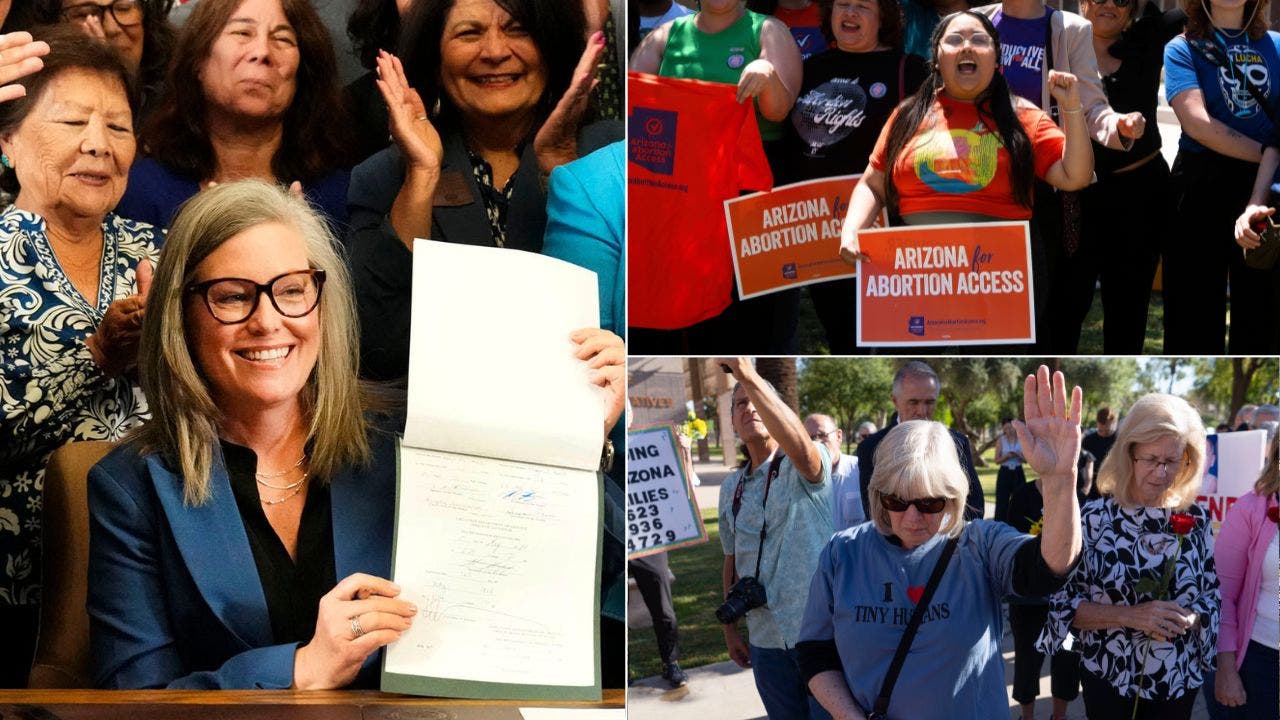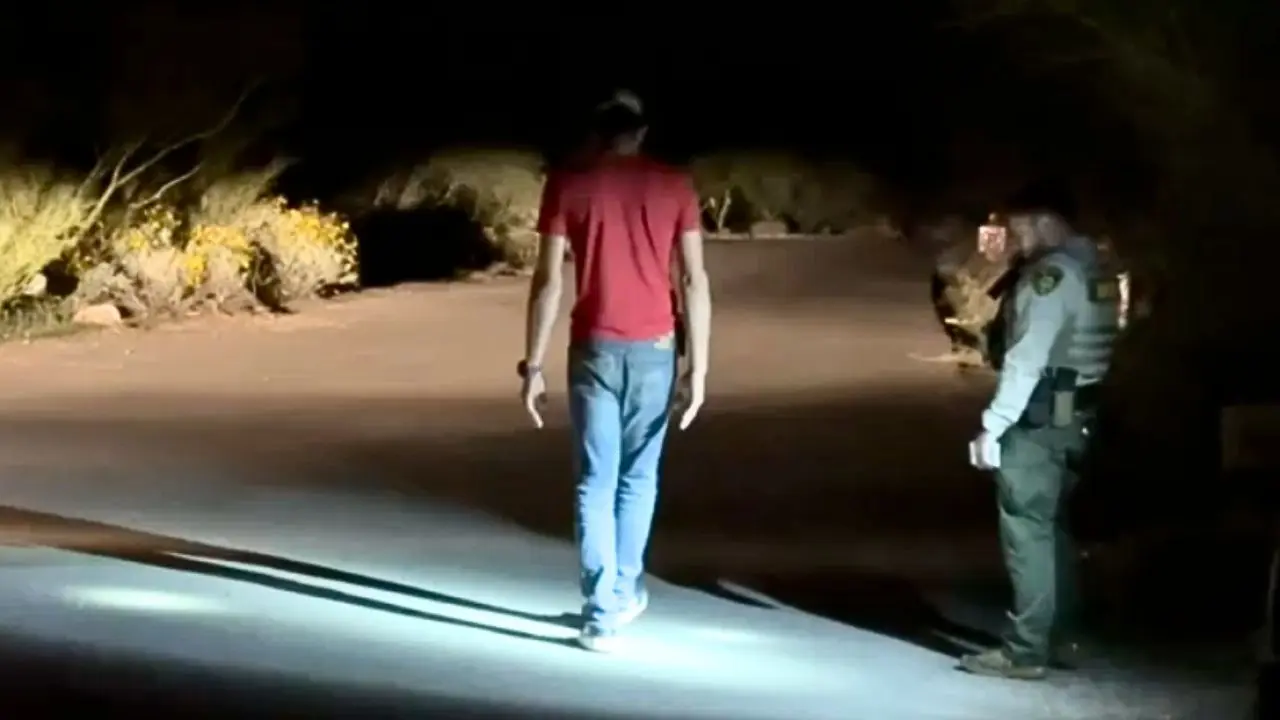Southwest
Arizona’s repeal of 1864 ban on nearly all abortions goes into effect

Arizona’s Civil War-era ban on nearly all abortions is officially being repealed on Saturday.
The long-dormant 1864 law, which predated Arizona’s statehood, had no exceptions for rape and incest, only for the life of the mother.
The 160-year-old law went into effect after the repeal of Roe vs. Wade in 2022 but faced court challenges which prevented it from being enforced.
WHAT TO KNOW ABOUT THE ARIZONA SUPREME COURT’S REINSTATEMENT OF AN 1864 NEAR-TOTAL ABORTION BAN
Arizona Gov. Katie Hobbs signs a bill repealing the state’s near total abortion ban that dates to 1864 during a news conference at the Governor’s Office on May 2, 2024. (Rob Schumacher/The Republic/USA TODAY NETWORK)
The ban was held up by the Arizona Supreme Court in April, throwing out an earlier lower-court decision that concluded doctors couldn’t be charged for performing abortions in the first 15 weeks of pregnancy.
But the decision sparked backlash in the battleground Grand Canyon State, with Democratic Arizona Gov. Katie Hobbs calling on the state legislature to repeal the ban.
Republicans hold a narrow majority in both chambers, but House Democrats were then able to garner the support of three Republicans to pass the repeal legislation in April following two previous attempts, sending the measure to the Senate for consideration. Two GOP senators joined with Democrats a week later to grant final approval and then Hobbs signed the bill in May, declaring it was just the beginning of a fight to protect reproductive health care in Arizona.
“I will continue doing everything in my power to protect reproductive freedoms, because I trust women to make the decisions that are best for them, and know politicians do not belong in the doctor’s office,” Hobbs said in a statement.
Pro-life advocates demonstrate prior to an Arizona House of Representatives session at the Arizona State Capitol on April 17, 2024, in Phoenix, Arizona. (Rebecca Noble/Getty Images)
Arizona House Speaker Ben Toma, a Republican, said at the time that he was “deeply disappointed” by the bill’s passing.
“We should not have rushed this bill through the legislative process,” he said in a statement shared with Fox News Digital. “The pre-Roe law has been on the books for decades and was readopted in 1977 by Democrats and Republicans in the State Legislature and signed by Democrat Gov. Raul Castro.
ARIZONA HOUSE LAWMAKERS PASS BILL TO REPEAL 1864 ABORTION BAN
“It would have been prudent and responsible to allow the courts to decide the constitutionality of the pre-Roe law. Instead, we are rushing to judgment for reasons I simply cannot understand.”
The state’s internal tussle over the issue was thrust into the national spotlight in March when Arizona state Sen. Eva Burch announced on the state Senate floor that she planned to have an abortion after learning that her pregnancy was not viable.
Arizona law now allows abortions until 15 weeks. After that, there is an exception to save the life of the mother, but missing are exceptions for cases of rape or incest after the 15-week mark.
The state requires those seeking an abortion prior to the 15-week mark to have an ultrasound at least 24 hours before the procedure and to be given the opportunity to view it. Minors must have either parental consent or authorization from a state judge, except in cases of incest or when their life is at risk.
Arizona state Rep. Stephanie Stahl Hamilton hugs state Sen. Anna Hernandez (right) after Arizona Gov. Katie Hobbs signed a bill repealing the state’s near total abortion ban that dates to 1864 during a news conference at the Governor’s Office on May 2, 2024. (Rob Schumacher/The Republic/USA TODAY NETWORK)
Voters will decide on whether to add the right to abortion to the state constitution when they have their say on Proposition 139 in the general election.
The measure secured a spot on the ballot after the pro-abortion group Arizona for Abortion Access, secured nearly 578,000 signatures, well over the 383,923 required from registered voters.
If voters approve the measure, abortions would be allowed until fetal viability — the point at which a fetus can survive outside the womb, typically around 24 weeks. It also would allow abortions after that time in cases where the mother’s physical or mental health is in jeopardy.
The Associated Press contributed to this report.
Read the full article from Here

Southwest
RICK PERRY: Where’s the beef? Trump knows and he’s trying to make it affordable

NEWYou can now listen to Fox News articles!
“America First” has been more than a slogan for President Trump. It has become a governing framework and near-mandate for his administration. America First policy decisions have manifested across immigration strategy, energy regulation, and, perhaps most clearly, trade policy.
The beef market has been in desperate need of an America First recalibration after President Joe Biden’s failed policies. Ground beef prices have become astronomical, reaching an average of $6.69 per pound in December, the highest price since tracking began in the 1980s.
These price increases are outpacing those of other food categories due to structural problems within the domestic beef market. Analysis from the American Farm Bureau Federation shows the domestic herd has fallen to a 75-year low and is continuing to shrink as fewer calves are retained for breeding. As a result, the U.S. cattle herd is unlikely to expand until at least 2028.
From my time as governor of Texas and agriculture commissioner for the nation’s leading cattle-producing state, I understand both the gravity of this situation and the need for a deliberate policy response.
Cattle are shown in pens at the Cattlemen’s Columbus Livestock Auction in Columbus on Wednesday, Oct. 8, 2025. (Melissa Phillip/Houston Chronicle/Getty Images)
In October, President Donald Trump addressed the need for beef affordability measures and signaled plans to increase imports, which he recently finalized through an executive order, opening the U.S. to an additional 80,000 metric tons of lean beef trimmings from Argentina this year.
This step is valuable because the U.S. does not produce enough beef to meet domestic demand, necessitating imports. Argentina is a strategic and well-suited partner to remedy our beef shortage because they specialize in lower-cost, lean beef. These trimmings from Argentina will be blended with fattier domestic beef to produce hamburgers and ground beef products – affordable staples in high demand.
Importing the specific type of affordable beef directly addresses supply and aligns with an America First approach. Expanding lean beef imports will reduce pressures on our beef supply, thus reducing costs for consumers while protecting cattle ranchers’ premium production.
THE SURPRISING REASON WHY AMERICANS COULD FACE HIGH BEEF PRICES FOR YEARS
The impacts of these smart imports are complemented and multiplied by broader efforts to strengthen the cattle sector, including Agriculture Secretary Brooke Rollins’ October plan to fortify the American beef industry and President Trump’s directive for the Department of Justice to crack down on foreign-owned meat packing cartels.
Beyond these efforts, the administration should reassess the existing allocation of tariff-rate quotas (TRQs), which were configured in 1995. Reworking would acknowledge shifts in global production patterns and domestic market needs, putting U.S. ranchers in a better position.
Today, the overwhelming share of tariff-free beef imports are dedicated to Australia and New Zealand. Both countries focus heavily on premium, grass-fed exports – products that compete directly with higher-end U.S. beef in domestic and international markets.
By contrast, lean beef imports from South America primarily serve the lower-cost blended segment. Ranchers and their supporters criticizing the import increase from Argentina, but failing to push back about the near-unlimited market access Australia and New Zealand have are fighting the wrong battles.
The beef market has been in desperate need of an America First recalibration after President Joe Biden’s failed policies.
Some policymakers have raised concerns that imports would sideline American ranchers and that we should focus on cutting red tape, lowering production costs and supporting cattle herd growth. These priorities are valid – but they’re not mutually exclusive with strategic imports.
RFK JR BACKS BEEF, DECLARING ‘WAR ON PROTEIN IS OVER’ AS HE THANKS AMERICA’S CATTLE RANCHERS
The notion that imports should be avoided is misguided and ignores structural supply realities. Strategic imports like lean trimmings can stabilize prices while allowing U.S. producers to concentrate on premium markets, where profitability is strongest. This is how we pave the path for rancher success.
CLICK HERE FOR MORE FOX NEWS OPINION
If U.S. ranchers are forced to simultaneously try and dominate serving both low-margin ground products and high-margin premium markets with higher-end cuts, they may become overwhelmed. From a long-term market perspective, overextension can discourage heifer retention and delay necessary herd rebuilding.
President Trump and his team are on the right path with the Argentina deal. This expansion should be defended unapologetically, incorporated beyond just 2026, and considered as part of a long-term strategy rather than a temporary measure.
CLICK HERE TO DOWNLOAD THE FOX NEWS APP
Permanently expanding Argentina’s tariff-free access to the U.S. market for lean beef trimmings is how we ensure prices stop rising. The administration should also consider opportunities for expanded imports from other South American nations, such as Paraguay and Uruguay, where production aligns with U.S. market gaps.
Building an American First beef market requires precision and long-term thinking. The current policy shifts are moving in the right direction, which will support ranchers, strengthen our market and deliver affordability for American consumers.
CLICK HERE TO READ MORE FROM RICK PERRY
Read the full article from Here
Southwest
5th Circuit clears Texas to enforce drag show law in front of minors, Paxton claims ‘major win’

NEWYou can now listen to Fox News articles!
An appellate court found on Wednesday that Texas can enforce a law regulating drag shows in public places and in the presence of minors, scrapping a lower court order that had enjoined the state from doing so.
A panel of the U.S. Court of Appeals for the 5th Circuit reaffirmed its November ruling, saying Texas can enforce the 2023 law regulating “sexually oriented performances.” The two-judge panel said only one plaintiff in the case had standing and sent the lawsuit back to the lower court to reevaluate the plaintiff’s First Amendment claim.
Texas Attorney General Ken Paxton, who is a candidate for Senate, framed the decision as a “major win” in a statement on social media.
“I successfully defended a law protecting children from being exposed to sexually illicit content at erotic drag shows,” Paxton said. “I will always work to shield our kids from exposure to erotic and inappropriate sexually oriented performances.”
A drag queen performs a routine set to the song “Killing in the Name” by Rage Against the Machine at the Texas State Capitol during the “No Kings” national rally in Austin, Texas on June 14, 2025, on the same day as President Trump’s military parade in Washington, D.C. (SERGIO FLORES/AFP via Getty Images)
The lawsuit, brought by numerous self-described LGBTQ organizations, centered on a state Senate bill that defined sexually oriented performances as visual performances that feature a nude person or sexual conduct and “[appeal] to the prurient interest in sex.” Under the law, a person could be prosecuted for causing a performance to occur in the presence of minors.
Judge Kurt Engelhardt, an appointee of President Donald Trump, authored the opinion and was joined by Judge Leslie Southwick, an appointee of former President George W. Bush.
The judges found that most of the plaintiffs, including a nonprofit called Woodlands Pride, did not have standing to bring First and Fourteenth Amendment challenges to the law because the groups’ performances were benign and therefore not relevant to the Texas law.
The judges said, however, that a group called 360 Queen Entertainment did engage in explicit enough performances, sometimes in the presence of minors, and therefore had standing.
APPEALS COURT SAYS TEXAS CAN ENFORCE DRAG SHOW BAN, SUGGESTS NOT ALL DRAG SHOWS VIOLATE STATE LAW
The Texas State Capitol in Austin (Brandon Bell/Getty Images)
“Based on the evidence introduced at trial, 360 Queen’s performances arguably include proscribed conduct,” Engelhardt wrote. “The owner described one performance where a drag queen, who was wearing a ‘very revealing’ breastplate, pulsed the breastplate in front of people and put the breastplate in people’s faces.”
Sometimes those performances were visible to children, Engelhardt noted.
The panel ordered the district court to evaluate whether 360 Queen was right to claim the Texas law violated its free speech rights under the First Amendment.
In a statement, Brian Klosterboer of the American Civil Liberties Union of Texas said the 5th Circuit effectively deemed some drag performances “family-friendly” but that the law, which will go into effect in March, still had perceived constitutional problems.
“The law’s vague and sweeping provisions still create a harmful chilling effect for drag artists and those who support them, while also threatening many types of performing arts cherished here in Texas, from theater to ballet to professional wrestling,” Klosterboer said.
An appellate court found on Wednesday that Texas can enforce a law regulating drag shows in public places and in the presence of minors, scrapping a lower court order that had enjoined the state from doing so. (Getty Images)
In 2023, Judge David Hittner, an appointee of President Ronald Reagan, found Texas’ law was unconstitutional. It is “not unreasonable” to think it could affect activities like live theater or dancing, Hittner wrote.
Last November, the 5th Circuit vacated that order. On Wednesday, it reaffirmed that decision and denied the plaintiffs’ request to rehear their appeal.
Read the full article from Here
Southwest
Man arrested on misdemeanor DUI charges outside Nancy Guthrie’s home after sobriety test

NEWYou can now listen to Fox News articles!
TUCSON, Ariz. — A 34-year-old man was arrested late Thursday night outside the Arizona home where Nancy Guthrie went missing earlier this month, the Pima County Sheriff’s Department told Fox News Digital.
Shortly before 8 p.m. Thursday, deputies arrested 34-year-old Antonio De Jesus Pena-Campos in front of Guthrie’s home on misdemeanor DUI charges, the department said.
The arrest is not related to the Guthrie investigation, the Pima County Sheriff’s Department added.
Pima County sheriff’s deputies stopped a blue Chevrolet Equinox compact SUV near Nancy Guthrie’s Tucson home late Thursday night. A man was later taken into custody after what appeared to be field sobriety testing. (Fox News)
Footage shows Pima County sheriff’s deputies shining a flashlight into the driver’s side of what appeared to be a blue Chevrolet Equinox compact SUV parked near the home where Guthrie was last seen Feb. 1.
Moments later, deputies spoke with Pena-Campos near a white canopy tent set up along the roadside as a deputy shined a flashlight toward the man’s face.
In another sequence, Pena-Campos walks in a straight line in what appears to be part of a field sobriety test. In subsequent footage, he is placed in the back of a sheriff’s pickup truck.
The man was detained as investigators continue searching for Guthrie, the 84-year-old mother of “Today” co-host Savannah Guthrie, who was reported missing Feb. 1 after authorities said she was taken during a home invasion. Investigators have said her pacemaker last synced with her iPhone around 2:30 a.m. that morning.
Her family has since offered a $1 million reward for information leading to her safe return as authorities continue to pursue leads.
NANCY GUTHRIE’S NEIGHBOR SAW SUSPICIOUS MAN WALKING NEARBY 2 WEEKS BEFORE SUSPECTED ABDUCTION
A deputy shines a flashlight toward a man’s face during what appears to be field sobriety testing outside Nancy Guthrie’s Tucson home late Thursday night. The man was later taken into custody. (Fox News)
The development comes after a Catalina Foothills resident’s street-facing Ring camera captured 12 vehicles passing by between midnight and 6 a.m. on Feb. 1, the morning Guthrie is believed to have been abducted.
Some of the activity occurred around the 2:30 a.m. mark, roughly when authorities said the 84-year-old’s pacemaker last synced with her iPhone.
A man walks in a straight line under the direction of deputies during what appears to be field sobriety testing outside Nancy Guthrie’s Tucson home late Thursday night. (Fox News)
Homeowners Elias and Danielle Stratigouleas told Fox News Digital that police had not canvassed their neighborhood in the 25 days since Guthrie was allegedly taken from her bed in what authorities have described as a home invasion kidnapping.
The couple said they alerted both the FBI and the Pima County Sheriff’s Department to the footage. It was not immediately clear whether the video would prove useful to investigators or whether any of the vehicles had traveled on Guthrie’s street.
CLICK HERE TO DOWNLOAD THE FOX NEWS APP
Pima County sheriff’s deputies speak with a man near a white canopy tent set up along the roadside outside Nancy Guthrie’s Tucson home late Thursday night. (Fox News)
The Stratigouleas home sits on a back road that leads out of Guthrie’s neighborhood and avoids major intersections. The property is approximately 2½ miles — or about a seven-minute drive — from the crime scene, according to Google Maps.
One of the videos was recorded at approximately 2:36 a.m., roughly eight minutes after Guthrie’s pacemaker last synced with her iPhone, based on the sheriff’s timeline.
Fox News’ Michael Ruiz and Olivia Palombo contributed to this report.
Read the full article from Here
-

 World4 days ago
World4 days agoExclusive: DeepSeek withholds latest AI model from US chipmakers including Nvidia, sources say
-

 Massachusetts4 days ago
Massachusetts4 days agoMother and daughter injured in Taunton house explosion
-

 Montana1 week ago
Montana1 week ago2026 MHSA Montana Wrestling State Championship Brackets And Results – FloWrestling
-

 Denver, CO4 days ago
Denver, CO4 days ago10 acres charred, 5 injured in Thornton grass fire, evacuation orders lifted
-

 Louisiana7 days ago
Louisiana7 days agoWildfire near Gum Swamp Road in Livingston Parish now under control; more than 200 acres burned
-

 Technology1 week ago
Technology1 week agoYouTube TV billing scam emails are hitting inboxes
-

 Technology1 week ago
Technology1 week agoStellantis is in a crisis of its own making
-

 Politics1 week ago
Politics1 week agoOpenAI didn’t contact police despite employees flagging mass shooter’s concerning chatbot interactions: REPORT













